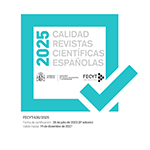I is another. Time and rift in the Deleuze’s tragic cogito
Abstract
Amongst the three ways of approaching Gilles Deleuze’s thought and German Idealism pointed out by Amanda Núñez García (2012), in which Fichte, Kant and Schelling are prioritized, respectively, this paper aims to follow the second one, and, by tracing the sources of the Deleuzian statements regarding time as a fissure in subjective identity, show the existence of a conception of the cogito different to the Cartesian one, in which the I no longer achieves full identification with itself. We will likewise show that this conception is first found in the Kantian paradox of self-knowledge, is then continued by Hölderlin and reaches Deleuze, and that the key element in order to think of this operation is time as a pure and empty form. We will take the analysis of the third passive synthesis of time developed by Deleuze in Difference and Repetition (1968) as a point of departure, and then examine the writings of Kant and Hölderlin with the aim of construing the Deleuzian stance.
Downloads
Article download
License
In order to support the global exchange of knowledge, the journal Logos. Anales del Seminario de Metafísica is allowing unrestricted access to its content as from its publication in this electronic edition, and as such it is an open-access journal. The originals published in this journal are the property of the Complutense University of Madrid and any reproduction thereof in full or in part must cite the source. All content is distributed under a Creative Commons Attribution 4.0 use and distribution licence (CC BY 4.0). This circumstance must be expressly stated in these terms where necessary. You can view the summary and the complete legal text of the licence.











